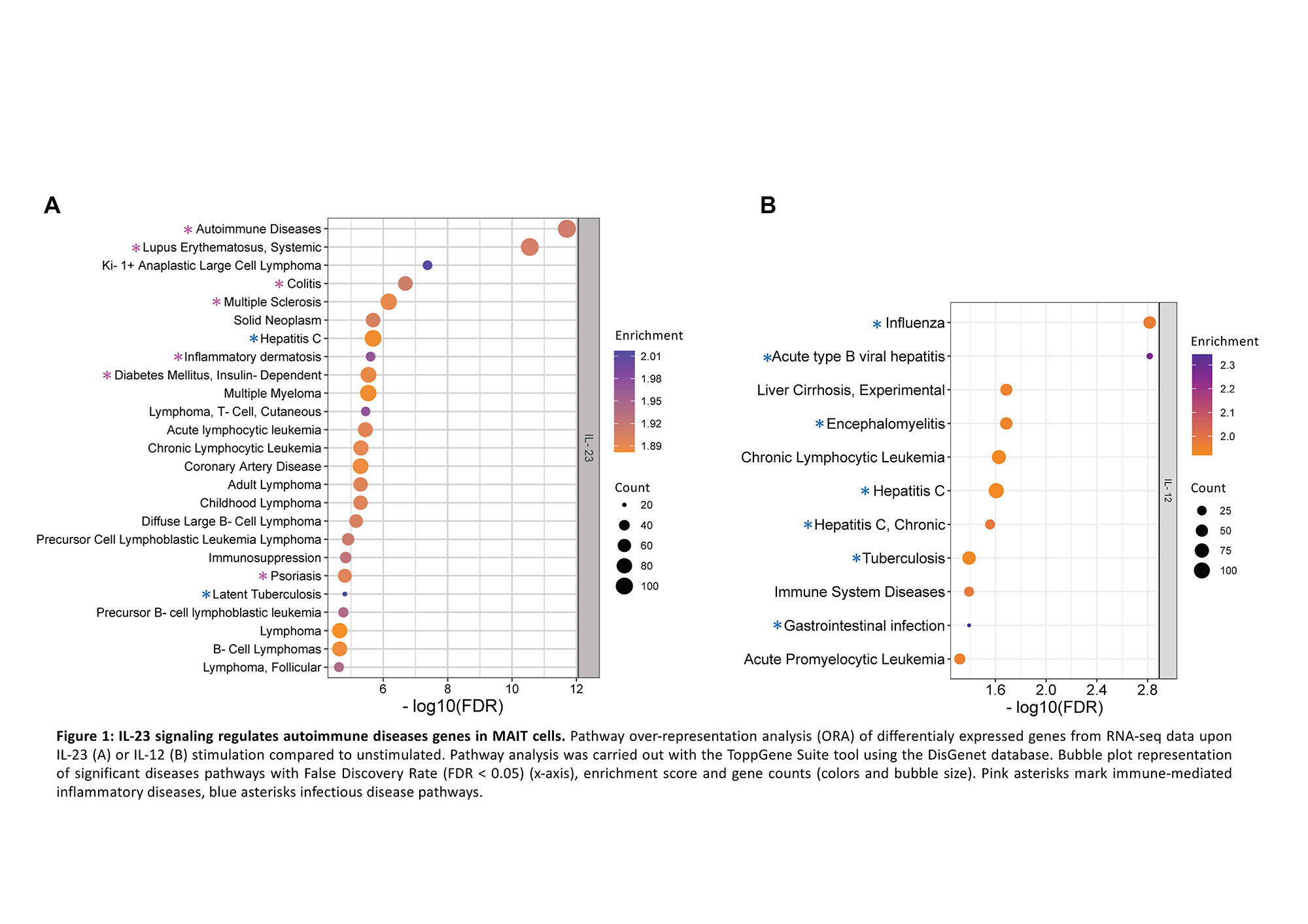Session Information
Date: Monday, November 14, 2022
Title: T Cell Biology and Targets in Autoimmune and Inflammatory Disease Poster
Session Type: Poster Session D
Session Time: 1:00PM-3:00PM
Background/Purpose: Genome-wide association studies and mouse models of autoimmune disease have demonstrated an important role of the IL-23 signaling pathway in the pathogenesis of axial spondyloarthritis (axSpA), psoriatic arthritis (PsA), psoriasis (Pso), and Crohn’s disease (CD). This notion has been validated in the clinics by the successful treatment of Pso, PsA, and CD with IL-23 blockers. However, despite a strong genetic association and pre-clinical models arguing in favor of IL-23 as a valid pharmaceutical target, IL-23-blockers failed in axSpA. This unexpected finding raised questions about the role of IL-23 in the pathogenesis of axSpA in particular and immune-mediated inflammatory diseases (IMID) in general.
The goal of this study is to identify the cellular and molecular targets of IL-23 and to define its role in IMID. Our recent results have shown that mucosal-associated invariant T (MAIT) cells expressed higher levels of IL23R transcripts than other immune cell populations (1).
(1) Rosine et al., Arthritis Rheumatol, 2022 Feb 14. doi: 10.1002/art.42090. Online ahead of print
Methods: Immune cell populations were monitored by spectral flow cytometry and isolated by cell sorting from PBMC of axSpA and Pso patients and healthy donors. MAIT cells were stimulated with an MHC related molecule 1 (MR1) tetramer presenting 5-OP-RU, in the presence or absence of IL-23. Gene expression and protein secretion were analyzed by RNA sequencing and multi-analyte profiling, respectively.
Results: Spectral flow cytometry analysis of immune cell populations from axSpA and Pso patients and healthy donors using a newly generated monoclonal antibody revealed that MAIT cells are the population with the highest frequency of IL-23R-positive cells. To identify IL-23 target genes, MAIT cells were activated with MR1-5-OP-RU tetramers in the presence or absence of IL-23. Activation of MAIT cells in the presence of IL-23 enhanced secretion of several cytotoxic molecules, however, did not increase IL-17A/F production by these cells, indicating that other molecules regulated by IL-23 may mediate its pathogenic functions. Pathway analysis of RNA-seq data revealed a significant enrichment of genes associated with autoimmune diseases in MAIT cells cultured in the presence of IL-23, while IL-12 preferentially induced genes associated with infectious diseases (Fig. 1). Ongoing functional studies address the contribution of these IL-23-induced genes to the immune functions of MAIT cells.
Conclusion: High-level expression of IL-23 receptors and IL-23-mediated induction of autoimmune disease genes demonstrate an important role of MAIT cells and this signaling cascade in the pathogenesis of IMID.
To cite this abstract in AMA style:
Stephen T, Dangien A, Leloup C, Mezghiche I, Camard L, Yahia-Cherbal H, Guillemot V, Pietrosemoli N, Lopez-Maestre H, Marsande J, Hasan M, Cua D, Fourie A, Greving C, Parker R, Joyce Shaikh B, Oulès B, Guégan S, Aractingi S, Bianchi E, Rogge L. IL-23 Signaling Induces Autoimmune Disease Genes in Mucosal-Associated Invariant T Cells [abstract]. Arthritis Rheumatol. 2022; 74 (suppl 9). https://acrabstracts.org/abstract/il-23-signaling-induces-autoimmune-disease-genes-in-mucosal-associated-invariant-t-cells/. Accessed .« Back to ACR Convergence 2022
ACR Meeting Abstracts - https://acrabstracts.org/abstract/il-23-signaling-induces-autoimmune-disease-genes-in-mucosal-associated-invariant-t-cells/

